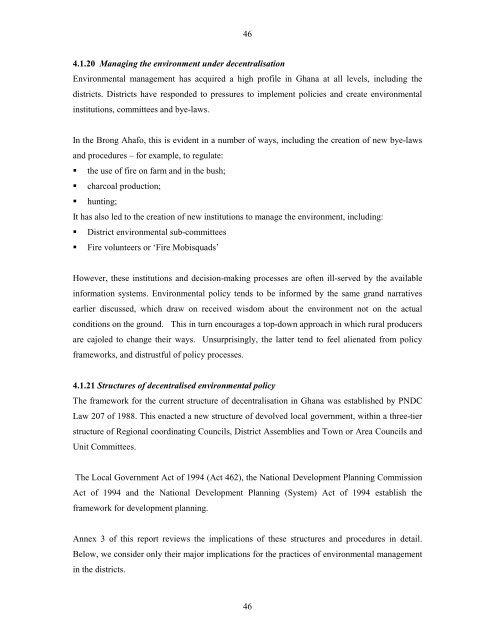Poverty Dimensions of Public Governance and Forest Management ...
Poverty Dimensions of Public Governance and Forest Management ...
Poverty Dimensions of Public Governance and Forest Management ...
Create successful ePaper yourself
Turn your PDF publications into a flip-book with our unique Google optimized e-Paper software.
46<br />
4.1.20 Managing the environment under decentralisation<br />
Environmental management has acquired a high pr<strong>of</strong>ile in Ghana at all levels, including the<br />
districts. Districts have responded to pressures to implement policies <strong>and</strong> create environmental<br />
institutions, committees <strong>and</strong> bye-laws.<br />
In the Brong Ahafo, this is evident in a number <strong>of</strong> ways, including the creation <strong>of</strong> new bye-laws<br />
<strong>and</strong> procedures – for example, to regulate:<br />
! the use <strong>of</strong> fire on farm <strong>and</strong> in the bush;<br />
! charcoal production;<br />
! hunting;<br />
It has also led to the creation <strong>of</strong> new institutions to manage the environment, including:<br />
! District environmental sub-committees<br />
! Fire volunteers or ‘Fire Mobisquads’<br />
However, these institutions <strong>and</strong> decision-making processes are <strong>of</strong>ten ill-served by the available<br />
information systems. Environmental policy tends to be informed by the same gr<strong>and</strong> narratives<br />
earlier discussed, which draw on received wisdom about the environment not on the actual<br />
conditions on the ground. This in turn encourages a top-down approach in which rural producers<br />
are cajoled to change their ways. Unsurprisingly, the latter tend to feel alienated from policy<br />
frameworks, <strong>and</strong> distrustful <strong>of</strong> policy processes.<br />
4.1.21 Structures <strong>of</strong> decentralised environmental policy<br />
The framework for the current structure <strong>of</strong> decentralisation in Ghana was established by PNDC<br />
Law 207 <strong>of</strong> 1988. This enacted a new structure <strong>of</strong> devolved local government, within a three-tier<br />
structure <strong>of</strong> Regional coordinating Councils, District Assemblies <strong>and</strong> Town or Area Councils <strong>and</strong><br />
Unit Committees.<br />
The Local Government Act <strong>of</strong> 1994 (Act 462), the National Development Planning Commission<br />
Act <strong>of</strong> 1994 <strong>and</strong> the National Development Planning (System) Act <strong>of</strong> 1994 establish the<br />
framework for development planning.<br />
Annex 3 <strong>of</strong> this report reviews the implications <strong>of</strong> these structures <strong>and</strong> procedures in detail.<br />
Below, we consider only their major implications for the practices <strong>of</strong> environmental management<br />
in the districts.<br />
46
















